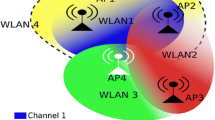Abstract
In this paper, we present a game analysis of the Binary Exponential Backoff (BEB), a popular bandwidth allocation mechanism used by a large number of distributed wireless technologies. A Markov chain analysis is used to obtain equilibrium retransmission probabilities and throughput. Numerical results show that when the arrival probability increases, the behavior of mobile stations MSs become more and more aggressive resulting in a global deterioration of the system throughput. We then consider a non-cooperative game framework to study the operation and evaluate the performance of the BEB algorithm when a group of MSs competing with each other to gain access to the wireless channel. We focus our attention to the case when an MS acts selfishly by attempting to gain access to the channel using a higher retransmission probability as a means to increase its own throughput. As a means to improve the system performance, we further explore the use of two transmission mechanisms and policies. First, we introduce the use of multiple power levels (MPLs) for the data transmission. The use of multiple power levels results on a capture effect allowing the receiver to properly decode the message even in the presence of a collision. Under the proposed scheme, named MPL-BEB, the effect of the aggressive behavior, higher transmission probabilities, is diminished since the power level is chosen randomly and independently by each and every station. Second, we introduce a disutility policy for power consumption. The resulting mechanism, named MPL-BEB with costs, is of prime interest in wireless networks composed of battery-powered nodes. Under this scheme aggressive behavior is discouraged since each retransmission translates into the depletion of the energy stored in the battery. Via price of anarchy, our results identify a behavior similar to the well-know prisoner’s dilemma. A non-efficiency of Nash equilibrium is observed for all schemes (BEB, MPL-BEB, MPL-BEB with costs) under heavy traffic with a notable outperformance of MPL-BEB with costs over both MPL-BEB and BEB.
Similar content being viewed by others
References
Altman, E., El-Azouzi, R., Jiménez, T.: Slotted Aloha as a game with partial information. Comput Netw 45(6), 701–713 (2004)
Altman, E., Barman, D., Benslimane, A., El-Azouzi, R.: Slotted Aloha with priorities and random power. In: Proceedings of IFIP Networking, Ontario, pp. 610–622 (2005)
Andrews, G.E.: The Theory of Partitions. Addison-Wesley Pub. Co., Advanced Book Program (Reading, Mass) (1976)
Bertsekas, D., Gallager, R.: Data Networks. Prentice Hall, Englewood Cliffs (1987)
Bianchi, G.: Performance analysis of the IEEE 802.11 distributed coordination function. IEEE J Sel Areas Commun 18(3), 535–548 (2000)
Dutta, D., Goel, A., Heidemann, J.: Oblivious AQM and Nash equilibria. In: Proceedings of IEEE Infocom (2003)
El-Azouzi, R., Sabir, E., Jiménez, T., Bouyakhf, E.H.: Modeling slotted Aloha as a stochastic game with random discrete power selection algorithms. Journal Comp Netw Communic 2009 (2009). doi:10.1155/2009/572650
Goodman, J., Greenberg, A., Madras, N., March, P.: Stability of binary exponential backoff. J ACM 35(3), 579–602 (1988)
Karouit, A., Orozco Barbosa, L., Haqiq, A.: Team study of the IEEE 802.16 collision resolution protocol. In: Proceeding of IFIP Wireless Days, pp. 1–6, Venezia, Italy (2010)
Lee, J., Tang, A., Huang, J., Chiang, M., Calderbank, A.: Reverse-engineering MAC: a non-cooperative game model. IEEE J Sel Areas Commun 25(6), 1135–1145 (2007)
Nelson, R.: Probability, stochastic process, and queueing theory. In: The Mathematics of Computer Performance Modelling, 3rd printing. Springer (2000)
Sabir, E., El-Azouzi, R., Hayel, Y.: Hierarchy sustains partial cooperation and induces a Braess-like paradox in slotted Aloha-based networks. Comput Commun 35(3), 273–286 (2012)
Sarker, J.H., Hassan, M., Halme, S.: Power level selection schemes to improve throughput and stability of Slotted Aloha under heavy load. Comput Commun 25(18), 1719–1726(8) (2002)
Author information
Authors and Affiliations
Corresponding author
Rights and permissions
About this article
Cite this article
Karouit, A., Sabir, E., Ramirez-Mireles, F. et al. A Stochastic Game Analysis of the Binary Exponential Backoff Algorithm with Multi-Power Diversity and Transmission Cost. J Math Model Algor 12, 291–309 (2013). https://doi.org/10.1007/s10852-012-9190-8
Received:
Accepted:
Published:
Issue Date:
DOI: https://doi.org/10.1007/s10852-012-9190-8




